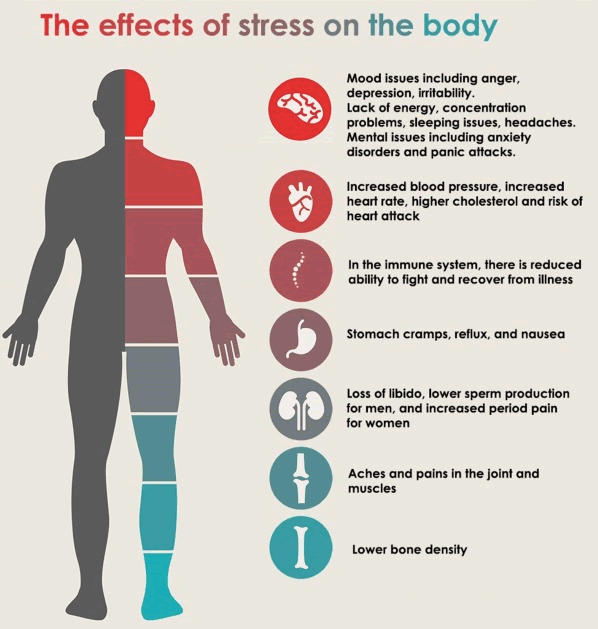Discover now all consequences of stress. What happens in the body in situations of stress. Consequences of stress.
Consequences of Stress and Signs
Stress can have wide ranging effects on emotion, mood, and behavior. Equally important but often less appreciated are effects on various systems, organs, and tissues all over the body, as illustrated in the following diagram.
Physical or mental stresses may cause physical illness as well as mental or emotional problems. Here are the parts of the body affected by stress:
Diagram of the Effects of Stress on the Body

Consequences of Stress on the Body
Hair: High stress levels may cause excessive hair loss and some forms of baldness.
Muscles: Spasmodic pains in the neck and shoulders, musculoskeletal aches, lower back pain, and various minor muscular twitches and nervous tics are more noticeable under stress.
Digestive tract: Stress can cause or aggravate diseases of the digestive tract including gastritis, stomach and duodenal ulcers, ulcerative colitis, and irritable colon.
Skin: Some individuals react to stress with outbreaks of skin problems such as eczema and psoriasis.
Reproductive organs: Stress affects the reproductive system causing menstrual disorders and recurrent vaginal infections in women and impotence and premature ejaculation in men.
Lungs: High levels of mental or emotional stress adversely affect individuals with asthmatic conditions.
Heart: Cardiovascular disease and hypertension are linked to accumulated stress.
Brain: Stress triggers mental and emotional problems such as insomnia, headaches, personality changes, irritability, anxiety, and depression.
Mouth: Mouth ulcers and excessive dryness are often symptoms of stress.
Emotional Consequences of Stress
There are numerous emotional and physical disorders that have been linked to stress including depression, anxiety, heart attacks, stroke, hypertension, immune system disturbances that increase susceptibility to infections, a host of viral linked disorders ranging from the common cold to herpes to certain cancers, as well as autoimmune diseases like rheumatoid arthritis and multiple sclerosis.
In addition, stress can have direct effects on the skin (rashes, hives and atopic dermatitis), the gastrointestinal system (GERD, peptic ulcer, irritable bowel syndrome, ulcerative colitis) and can contribute to insomnia and degenerative neurological disorders like Parkinson’s disease. In fact, it is hard to think of any disease in which stress cannot play an aggravating role or any part of the body that is not affected (see Effects of Stress on the Body diagram). This list will undoubtedly grow as the extensive ramifications of stress are increasingly being appreciated.
Share this page with your friends:
Help your friends and family to know themselves better. Share this page, they will appreciate it... and all thanks to you! 100% stress advices and free tests :-)

